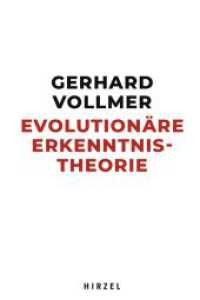- ホーム
- > 洋書
- > 英文書
- > Philosophy
Full Description
Our understanding of what it means to be a parent in any given context is shaped by our biological, social, legal, and moral concepts of parenthood. These are themselves subject to the influence of changing expectations, as new technologies are produced, cultural views of the family are transformed, and laws shift in response. In this book Teresa Baron provides a detailed and incisive overview of the key questions, widespread presuppositions, and dominant approaches in the field of philosophy of parenthood. Baron examines paradigm cases and problem cases alike through an interdisciplinary lens, bringing philosophy of parenthood into dialogue with research on family-making and childrearing from across the social sciences and humanities. Her book aims to answer old questions, draw out new questions, and interrogate notions that we often take for granted in this field, including the very concept of parenthood itself.
Contents
Introduction; 1. Babies, blueprints, and blood ties: what makes a biological parent?; 2. Social roles, stereotypes, and being 'seen' as a parent; 3. 'Do you have a licence for that?' Legal parenthood and transfers of children; 4. Duties, dilemmas, and (re)distribution: moral perspectives on parenthood; 5. Paradigms and parental projects: the intersection of parenthood and reproductive ethics; Conclusion.








